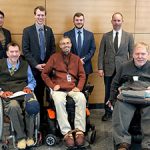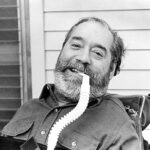In their most recent newsletter (PDF), the Minnesota Council on Transportation Access (MCOTA) interviewed MCD council member Ted Stamp. Ted’s story is an example of how grassroots advocacy can turn a disability issue—the lack of accessible transportation options—into meaningful policy when we work together for change. Thanks to those efforts, Minnesotans with disabilities have better Continue Reading Getting Personal Care Attendants Behind the Wheel: A Story of Grassroots Advocacy
News
Continuing the Education Advocacy of Ed Roberts
Ed Roberts is a towering figure in the history of disability rights. His advocacy challenged perceptions and created opportunities for people with disabilities, particularly in higher education. Roberts, who contracted polio and was paralyzed from the neck down at 14, defied expectations to become the first wheelchair user to attend the University of California, Berkley. His efforts started a movement that continues to champion accessibility, inclusivity, and empowerment in higher education. Inspired by this kind of education activism, guest Baya Clare tells us about their debt to Ed’s work and their own disability advocacy.
MCD Remembers Disability Advocate Master Hinkle
Master Hinkle, a fierce advocate for acceptance and access, passed away from renal failure on Friday, February 15. He was 36. Master gave to his community as an athlete and a coach. He coined the acronym R.A.G.E. – “Remember, Always Give Everything.” As a Keep Moving Forward participant, he showed us some of that “Always Give Everything” spirit in his segments.
Reasonable Accommodations for Employees with Disabilities is Good Policy
At the close of the 2023 Minnesota Legislative Session legislators passed an economic development that included provisions establishing the Minnesota Employer Reasonable Accommodation Fund (ERAF). The ERAF provides grants to small businesses and non-profit organizations to cover the cost of reasonable accommodations for their employees with disabilities. Legislation like ERAF is good policy because it helps turn Minnesota’s vision of an inclusive society into a reality for every business, large or small.
Mental Health and Holiday Inclusion
It’s important to remember that this time of year is not easy for everyone. Some of us have lost loved ones on or around the holidays. We might be feeling ill or struggling with pain. Sometimes, this time of year, it is tough to get the accommodations we need to participate, and it could feel like our disabilities might be holding us back. We might be overwhelmed and stressed by the obligation of presents and food, the gatherings, or traveling. Remember to be patient with people during the holiday season. You never know what someone is going through.
Holiday Inclusion and Sensory Sensitivities
Depending on our disability, some of us might be more sensitive to things such as scent, texture, and noise. Generally, holiday decorating is synonymous with scents of balsam and fir, oak and musk, cinnamon, and clover. There can be different food and textures, or strong scents involved with cooking. Holiday lighting, often blinking, adorns houses and trees on the inside and outside. We often do not realize that some of the things included in our decorating, food, or homes can become overwhelming for some people.





